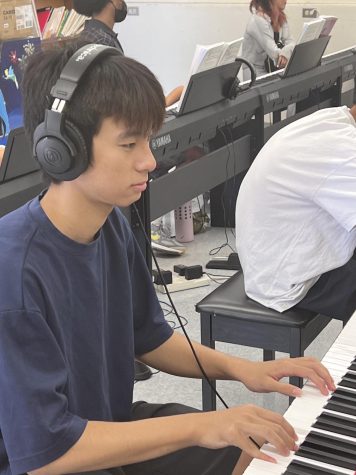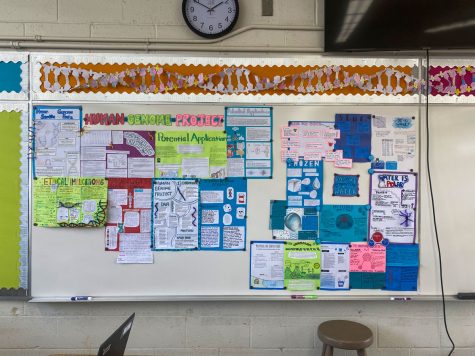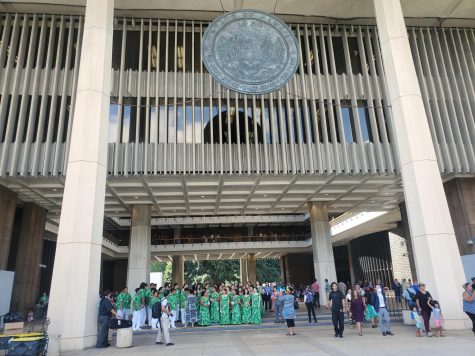Kalani hosts AP informational meeting
Kalani High School hosted an Advanced Placement informational meeting for freshmen, sophomores, and juniors on Wednesday, Nov. 20 during Advisory in the school’s cafeteria.
Advanced Placement courses enable high school students to earn college credits through college-level courses while in high school.
I believe AP courses are worth it if you are willing to put in a bit of extra time to study for them.
— Regina Lee (11)
Teachers Mr. Kendrick from AP Language and AP Research, Dr. Ida from AP Computer Sciences and Calculus, Mr. Zane from AP Economics, Mr. Okawa from AP Research and Biology, Ms. Takayesu from AP Literature, and Ms. Kaaihue from AP Psychology presented advice and course information at the hour-long meeting.
Kalani’s 2020-2021 AP Program Enrollment Contract sets guidelines for those planning on taking AP courses.
Individuals must complete an Advanced Placement pretest in May 2020 if the AP teacher requires it.
“Pretests are done by individual AP teachers and there isn’t a set rule on that but it’s a way for teachers to gauge where the incoming students are at and for the students to see what kind of level they should be at,” counselor Lisa Hayashi explains.
The assessment scores do not restrict freshmen and sophomore students from enrolling in AP. However, junior students must meet certain standards or they will need to meet with the principal to request permission.
“For juniors, they must score at least a meets on their statewide test to be academically eligible to take an AP course during their senior year,” Mrs. Hayashi says. “If they do not score at least a meets but still wants to take an AP course, a meeting must be scheduled with Mr. Otani.”
Assessment fees accumulate to approximately $98. Free and Reduced Lunch Program members are offered fee waivers and subsidies.
AP registrants receive their final withdrawal opportunity on May 28. Those who do not withdraw must continue their AP course without exceptions. Those who cannot maintain their AP grades are assigned to remedial classes in addition to their scheduled school courses.
Individuals accepted into AP are also obliged to take an exam in May based on the AP course(s) they took that school year. Failure to comply will result in the student losing their AP designation. However, the scoring will not impact the student’s grade.
According to Mrs. Hayashi, how the exam influences the student is decided by the college they enroll in. Students must pass the test to receive college credits — with the exception of colleges that do not consider Advanced Placement courses for college credits.
Students should also acknowledge a few class-specific pointers before deciding on an AP course.
Those interested in AP Seminar and AP Research must know the two are hand-in-hand year-long courses; AP Seminar progresses into AP Research. Students should not enroll in AP Seminar during senior year, as they will not be able to take AP Research the following year.
Potential AP Economics students should also understand that their first semester is graded on a 4.0 GPA scale. Their AP course begins in the second semester, graded on a 5.0 GPA scale.
Mr. Okawa explains that, although AP Biology’s single prerequisite is taking a Biology class, it is helpful to have a background in Chemistry. Mr. Okawa said that, in his experience, the highest grade from someone without experience in Chemistry is a D.
Regina Lee (11) took AP Seminar her sophomore year and is currently taking AP Research, AP Computer Science, AP Language, and AP Psychology.
“I believe AP courses are worth it if you are willing to put in a bit of extra time to study for them,” Lee states.
Lee believes AP courses are valuable “as I am thinking about out of state college” and because taking accelerated courses “shows rigor” on her high school transcript.
Elective and AP registration opens on Wednesday, Dec. 4, at 10:52 p.m., and ends on Wednesday, Dec. 11, at 3 p.m.
The College and Career Center warns that AP course decisions should not be made through peer pressure, but should match an individual’s interest in college, career, or passion.
Individuals should review the academic expectations and policies of their desired schools to see if accelerated courses fit their goals.
Individuals should review the academic expectations and policies of their desired schools to see if accelerated courses fit their goals. The College and Career Center emailed students scholarly recommendations from colleges and universities like UH Manoa, MIT, and Stanford.
Mr. Okawa advises students to research their potential Advanced Placement course and seek feedback from parents, counselors, and students who have or are experiencing AP’s rigor.
If you need more detailed information about specific Advanced Placement courses, attend some of the AP classes presenting during the Elective Fair on Wednesday, Dec. 4.
Summer school students who require signatures from teachers that they did not have during the school year need to speak with the AP teachers directly.
Kalani students should check their Gmail for important announcements from the College and Career Center.

Saara Nicole Chadwick is a 15-year-old freshman at Kalani. Although soft-spoken and mellow, most people are surprised when her murmurs spontaneously turn...















![User Mike1024 on en.wikipedia [Public domain], via Wikimedia Commons](https://www.kaleookalani.org/wp-content/uploads/2018/11/Screen-Shot-2018-11-16-at-8.28.11-AM-357x475.png)
caleb • Jan 17, 2020 at 6:17 pm
YEAAAHHHHHH SAARARARARRARARA WOOOOOOOOO